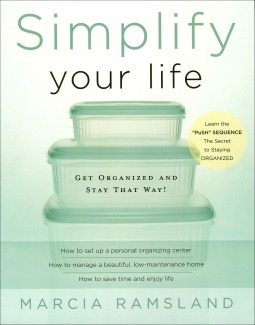Are You a Perfectionist? 3 Ways to Know
Marcia Ramsland is an organizer extraordinaire! With that accolade, you might expect her to be a perfectionist, but the good news is, she knows what to do with that tendency. In this Wisdom UPGRADE, she not only pinpoints the characteristics of perfectionism, she offers helpful insight to recover from it.
she not only pinpoints the characteristics of perfectionism, she offers helpful insight to recover from it.
"Are you a Perfectionist? I have to confess I am," Marcia said. "Sometimes I’m proud of it, and other times I have to sheepishly say 'guilty.' I bet you might be a perfectionist, too, in at least one area of your life.
I (Dawn) am right there with you, Marcia.
It's taken me almost a lifetime to learn how to deal with perfectionism, so I know what you say is true!
Marcia continues . . .
3 Ways to Know You’re a Perfectionist
One of the ways to discover you’re a perfectionist is to listen to what you say.
Have you ever said:
- “I’m just about done. Give me another minute.” (And it stretches into 20 minutes.)
- “I would have done a better job, but I had to turn it in.” (Blaming others is old school.)
- “I don’t really plan to be perfect, I just want to do it right!” (Is that a problem?)
Yes, perfectionists want to do it “right” in the areas that are important to them, but have trouble recognizing when “enough is enough” on a task.
This can be satisfying to our perfectionist tendencies, but irritating to those who have to wait for us to finish.
Another Way to Know You’re a Perfectionist
Being a Selective Messie!
Another way I can tell when a client is a perfectionist is to look at what’s NOT organized in their life. For example, their home might be immaculate, but their desk is a mess!
The reason a perfectionist’s lifestyle is so black and white is because perfectionists tend to not start a project until they know how to do it perfectly! Hence the cluttered desk, man cave, garage, or kitchen.
The 3 R’s of Perfectionism Recovery
Can we stop the dark side of our perfectionism and turn it around for good? Yes, of course!
1. Recognize where perfectionism shows up in your life.
It could be in a small area like picking up everything at home before going out the door and arriving late to appointments.
2. Recognize what it’s costing you and how it affects others.
Check your family and friends displeasure and that could be a clue where your perfectionism lies.
3. Resolve to Make a Change in One Area at a Time
Rome wasn’t built in a day, nor will our tendency that took years to develop go away in a moment of insight. Be persistent to overcome the habit.
If you have trouble stopping your perfectionism—whether it’s responding to every last email or social media comment—it’s time to look at how this habit is impacting you and those around you. It may be time to “fess up” and drop a tendency that could be holding you back.
Why give up perfectionism? Because there’s so much God has for us to do to benefit ourselves and others.
The verse that motivates me personally to give perfectionism up is:
“For we are God’s handiwork, created in Christ Jesus to do good works, which God prepared in advance for us to do” (Ephesians 2:10).
Here's a Tip:
Learn the difference between striving for excellence and insisting on perfection.
Pursuing perfection zaps our energy, while striving for excellence brings joy in passing milestones toward our desired result.
Are you addicted to perfectionism? Do you want to recover? Which of the 3 R's for Perfectionism Recovery would help you most today?
 Marcia Ramsland is well known as the “Organizing Pro” and author of the Simplify Your Life: Get Organized and Stay that Way book series, which has
Marcia Ramsland is well known as the “Organizing Pro” and author of the Simplify Your Life: Get Organized and Stay that Way book series, which has  sold over 100,000 copies. Marcia regularly teaches online courses and coaches individuals to be highly productive personally and professionally. She believes anyone can become more organized and live with ease - even YOU! For courses and personal coaching, visit www.organizingpro.com.
sold over 100,000 copies. Marcia regularly teaches online courses and coaches individuals to be highly productive personally and professionally. She believes anyone can become more organized and live with ease - even YOU! For courses and personal coaching, visit www.organizingpro.com.
Graphic adapted, courtesy of Geralt at Pixabay.
 Post a Comment → Posted on
Post a Comment → Posted on  Thursday, March 21, 2019 at 11:11AM
Thursday, March 21, 2019 at 11:11AM  Habits,
Habits,  Marcia Ramsland,
Marcia Ramsland,  Overcoming Perfectionism,
Overcoming Perfectionism,  Perfectionism,
Perfectionism,  Perfectionist,
Perfectionist,  Perfectionistic thinking,
Perfectionistic thinking,  Stress,
Stress,  Upgrade with Dawn Upgrade Your Life
Upgrade with Dawn Upgrade Your Life  Organization,
Organization,  Wisdom
Wisdom 







